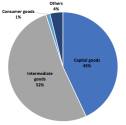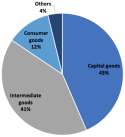You think inflation is bad right now? Just wait until supply shocks induced by Trump tariffs cause all your financial assets to become worthless! You think 5 dollar coffee is bad right now: wait until coffee costs $20 due to asset money flooding into the commodities economy.
The FIRE people are gonna be in for a tough time if Trump wins. Hence all the Wall Street donations to Kamala, she can keep the charade going for a bit longer.
Even though I don't like Trump, much less Kamala, I don't think he's going to do what you and I are thinking, start taxing everything like crazy.
There will undoubtedly be tariff wars, but I don't think they will be as widespread as we imagine, especially in times like these of ongoing deglobalization, where economic decoupling is almost carried out by inertia due to several factors.
However, it's worth reflecting on all the ways in which that trade war seems to diverge from the historical pattern. In the end, we come to an important conclusion: that trade war was not born from a strategy, but rather from mere ideology.
It's worth mentioning a few factors for this:
1. The American economy was strong at the time
Normally, politicians adopt protectionism in times of economic recession. The completely senseless goal is to protect national companies from foreign competition, guaranteeing a market reserve for them. However, as the tragic consequences of the Smoot-Hawley tariff show us, this measure simply makes everything worse.
Nowadays, however, the situation is quite different. After a long and slow recovery since the 2008 financial crisis, the American economy had started to accelerate again. Not only were the main macroeconomic indicators – such as income and wage growth – robust, but the unemployment rate was at its lowest level since 1968.
So what is the real problem to be solved? Some say that employment in the industrial sector was falling, which was true, but American industrial production has never been higher, as has the income of these employees. Furthermore, employment in the industrial sector reached its last peak in 1980, and has been in a continuous decline since then. Therefore, it simply makes no sense to adopt an economic policy in 2018 to solve an apparent “problem” whose trend has been clear for 40 years. The reduction of human labor in the industrial sector is not only an inevitable phenomenon, but it is also humanly desirable.
Furthermore, the American economy was already fully adapted to globalization. No American will be able to name a single product purchased in the last 5 years that did not use some "foreign" production process in its manufacture.
In the end, the great irony of this point is that it is precisely the robust economy of the period that has made it possible for this policy of the Trump administration to have longevity. If the country were in a recession, protectionism would quickly worsen the situation for everyone, as it would bring an immediate increase in the cost of living at a time of high unemployment and falling incomes; however, if the country is in economic growth, the deleterious effects of protectionism can be significantly mitigated. Rapid economic growth and a low unemployment rate make economic nationalism possible without feeling its rapid and obvious deleterious effects.
2. There is no end to the inflammatory political rhetoric
Every statement and tweet indicated more and more escalation of the war. Trump was already threatening to impose tariffs on China totaling $550 billion. The number is so colorful that it’s almost funny: given that total imports from China were only $500 billion in 2017, it seems that Trump simply took that figure and added another $50 billion.
And get this: Trump’s top trade adviser said in an
with Fox News (minute 3:20) that “I don’t think any country in the world is going to retaliate…”.
Guess what? He was completely wrong. But still, there was no sign of backing down. So what’s the real goal here? If there’s no goal, there’s no real victory.
3. Tariffs hit inputs and capital goods, not consumer goods
This is the most curious and strange point of all. According to a study by the Centre for Economic Policy Research, protectionism was practically all aimed at machinery, inputs and other production goods, and not at consumer goods.
The overwhelming majority of cases of protectionism were aimed at consumer goods. Trump's tariff war was not. An incredible 95% of the tariffs applied were on capital goods and intermediate goods. These are the materials that American companies and industries used to manufacture products. They began to pay more, which led to an artificial increase in their production costs (which is why small and medium-sized companies were being negatively affected, as demonstrated by the news listed at the end of item 1).
This first graph shows the incidence of all tariffs.

This second graph shows only the tariffs for China.

These are remarkable numbers. The question, again, is: was there a strategy in all of this? It’s really hard to see any. There’s no indication that the tariffs were created to pressure China into accepting the demands of the US government, since no one can figure out exactly what Trump wanted from China.
The only plausible explanation is that Trump wanted everything to be manufactured in the US. He’s trying to inspire a retooling and reorganization of the entire industrial base of the US economy, making it look like it did in the 1970s, with heavy industries using human labor to do boring, exhausting, and health-damaging jobs.
This kind of nostalgia hides a profound lack of knowledge: in today’s world, economies based on heavy industrial labor are backward; developed economies are those that focus on technology and services. Heavy industrial jobs have always been unhealthy and, therefore, undesirable. Anyone who’s been there knows well: working in manufacturing is totally punishing from a health perspective. It’s a dull and monotonous environment. The industrial worker spends eight hours a day doing repetitive and exhausting work. He is the perfect caricature of the robotic man. A rich country is one that has already passed this phase and has already outsourced it to poorer countries, which, precisely because they do not yet have the same level of wealth, still submit to this.
Imposing import tariffs to regress the economy to this arrangement is not a form of negotiation. It is simply an atrocious form of industrial planning based on the autarchy model -- an impossible delusion that, if realized, would lead to a profound decline in the standard of living of Americans (currently the highest in the world).
4. The excuses were many
One way to tell the difference between an excuse and a rational justification is in the litany.
You ask someone, "Why can't you go to the party?" And they respond, "Oh, I have to write my thesis, my dog is sick, I'm waiting for my mom to call, my car is broken down, and it looks like it's going to rain."
If you start hearing these kinds of excuses, you know for sure that there's something more behind it all.
The same thing happened with Trump's trade policies. The excuses never end, and they were always changing: trade deficit, disrespect for intellectual property, national security threats, excessive subsidies given by other countries to their industries, currency manipulation by China, or any combination of all of these.
Just like the excuse for not going to the party, there comes a point where none of these are really believable. And then there’s the fact that Trump has been advocating economic nationalism since the 1980s, so it’s implausible that these actions are actually a response to current economic events. Rather, they are a product of ideology.
5. In the end, it was the Americans themselves who were paying
The US government said that these tariffs were imposed on foreign countries. False. As powerful as the US is, its government cannot make China, Canada, Europe or Mexico pay for anything.
Import tariffs are an extra fee that the customs of the country where the goods arrive add to the final value of the product already purchased. In other words, tariffs are paid by producers and consumers of the importing country. It is a tax. Pure and simple.
In the end, all five of these characteristics of that trade war point to what is perhaps the most frightening dimension of this entire fiasco: it is ideology that was fueling all of this. Trump is a believer in national economic planning, which means autarchy. This allows him to be the CEO of the country, to manage every company, to punish his enemies and reward his friends, and to have many of his admirers hail him as a great leader.
Ironically, this is the classic tactic of the "great man" who follows the old Hegelian presumption that he is guiding history in the right direction.
The result could not be different:



